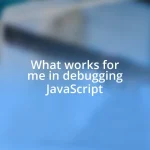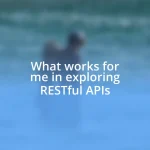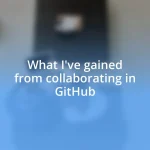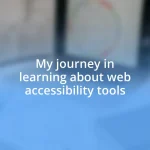Key takeaways:
- Collaboration on GitHub enhances skills through diverse perspectives, constructive feedback, and learning opportunities, fostering personal and professional growth.
- Engaging in teamwork leads to a sense of community, shared victories, and the motivation to overcome challenges together.
- Building a GitHub portfolio showcases teamwork experience and coding versatility, enhancing visibility to potential employers.
- Effective collaboration strategies include clear communication, active participation in code reviews, and sharing responsibilities to strengthen team dynamics.

Benefits of Collaboration in GitHub
One significant benefit I’ve experienced through collaboration on GitHub is the wealth of diverse perspectives. I remember a project where my initial idea was completely transformed by feedback from teammates across the globe. It made me think: how often do we let our own ideas overshadow other potentially brilliant concepts? This blend of creativity usually leads to innovative solutions that I wouldn’t have arrived at alone.
Another aspect of collaborating on GitHub is the learning curve it presents. When I first joined a project, I was initially intimidated by my peers’ expertise. But as I actively participated, I found myself acquiring new skills and insights. Isn’t it fascinating how working alongside talented individuals can accelerate our growth? This exchange of knowledge not only uplifts the project but deeply enriches my own understanding.
Furthermore, I find that collaboration fosters a sense of community. During a late-night coding session, I often recall the excitement and camaraderie that comes from tackling challenges as a team. That feeling of shared victory, whether we faced bugs or celebrated successful merges, is incredibly fulfilling. It makes you realize that achieving something remarkable is far more rewarding when you can share the journey with others.

Enhancing Skills Through Collaboration
Collaborating on GitHub has truly enhanced my technical skills in ways I never anticipated. For instance, while working on a complex module, I was challenged by a team member to write tests using a new framework I was unfamiliar with. Initially daunting, this experience made me realize how pushing my boundaries not only improved my coding abilities but also fostered a sense of confidence. Have you ever found yourself in a similar situation where a bit of pressure from collaboration pushed you to up your game?
Moreover, I’ve discovered that code reviews are an invaluable tool for skill enhancement. I remember the first time I received constructive feedback on my code; it felt a bit like a personal critique, but over time, I learned to see it as an opportunity for growth. Engaging in the process of reviewing others’ work sharpened my critical thinking and analytical skills, turning code review sessions into collaborative learning experiences. It’s amazing how sharing insights not only benefits individual growth but collectively raises the team’s capabilities.
Lastly, the collaboration tools available on GitHub have greatly improved my organizational skills. I used to struggle with managing multiple tasks and timelines, but with the use of issues and pull requests, I gained a structured approach to project management. This newfound proficiency has translated into my daily work, making me more efficient and focused. It truly illustrates how teamwork can foster personal development in unexpected ways.
| Skill Enhanced | How Collaboration Helped |
|---|---|
| Technical Skills | Challenged by peers, leading to confidence and improved coding |
| Critical Thinking | Engaging in code reviews fostered analytical skills through shared feedback |
| Organizational Skills | Utilized collaboration tools for better task and project management |

Building a Stronger Portfolio
When it comes to building a stronger portfolio, showcasing collaborative projects on GitHub is a game-changer for me. Each repository I contribute to tells a story—not just of the code, but of the teamwork and problem-solving behind it. I still remember the thrill of seeing my username beside others on a features list. It made me realize that my contributions matter, and they display my ability to work in dynamic team environments, which employers increasingly value.
- Demonstrates teamwork skills in a practical setting
- Highlights diverse projects that showcase coding versatility
- Provides evidence of problem-solving through collaboration
- Signals engagement within the developer community
Each contribution adds not only to my skillset but also to how others perceive my work. Sharing these projects allows potential employers to see a trajectory in my growth, brought about by the collective effort of a team. It’s much more compelling than a solo project, and it shows that I can thrive in collaborative settings.
I find that my GitHub portfolio also serves as a reflection of my journey. Each commit represents a lesson learned, whether from a pivotal code review or a late-night debugging session with my peers. It’s exhilarating to revisit those projects and remember the challenges we faced and overcame together. Each successful pull request feels like a badge of honor, showcasing not just my skills but my commitment to learning and improving alongside others.
- Reflects my growth and learning on each project
- Highlights the joy of overcoming challenges as a team
- Serves as a motivational reminder of what collaboration can achieve
- Illustrates commitment to ongoing learning and development

Networking with Other Developers
It’s fascinating how networking with other developers on GitHub can completely transform your professional outlook. I still remember when I reached out to a developer whose work I admired. To my surprise, not only did he respond, but he also took the time to offer insights on my projects. That simple exchange sparked a friendship and opened doors to collaborative opportunities I hadn’t even considered before. Isn’t it amazing how a small interaction can lead to meaningful connections?
Through my GitHub journey, I’ve connected with developers worldwide, sharing ideas and learning from different perspectives. I recall a project where we had team members from five different countries, each bringing unique skills to the table. The rich tapestry of backgrounds and experiences deepened our discussions and, quite honestly, made our solutions that much better. Have you ever had a moment where collaboration with someone from another culture shifted your thinking entirely?
Ultimately, the real beauty of networking on GitHub lies in the relationships that grow beyond just coding. There have been moments when a simple chat led to job offers, mentorships, and lifelong friendships. I can’t stress enough how those connections often evolve into a support system that encourages personal and professional growth. It’s the kind of bond that lifts you up during tough challenges and helps you celebrate the wins together—hard to find that kind of value elsewhere, right?

Contributing to Open Source Projects
Contributing to open source projects on GitHub has been one of the most rewarding experiences in my developer journey. One memorable project involved collaborating with a diverse group to rebuild a flagship tool for a nonprofit organization. The sense of purpose was palpable; every line of code contributed wasn’t just about technical skills, but about making a real-world impact. Have you ever felt that special pride when your work aligns perfectly with a cause you care about?
As I dove into these projects, I found myself mentored by more seasoned developers who guided me through complex codebases. I vividly remember a moment when I struggled with a particularly stubborn bug; a fellow contributor jumped in to help me troubleshoot, turning a frustrating experience into an exhilarating learning opportunity. That shared challenge created an unspoken bond among us, reminding me of the incredible collaborative spirit that defines the open source community.
What truly stands out to me is the inclusive nature of open source. Each contribution, big or small, is welcomed, making it a space where everyone’s voice matters. I often found myself inspired not only by the code we wrote but by the stories behind them—how each contributor brought unique backgrounds and experiences that enriched our work. This kind of environment fosters creativity and innovation, encouraging me to think outside my usual box. Don’t you agree that being part of such a vibrant community can challenge and elevate our thinking in remarkable ways?

Gaining Feedback and Learning
Gaining feedback on GitHub has been a game changer for my development skills. I remember submitting my first pull request and being both excited and terrified. When feedback started pouring in, it wasn’t just the practical advice that mattered; it was the encouragement I received that made me feel part of something bigger. Have you ever experienced that blend of anxiety and anticipation when you put your work out for critique?
Through these interactions, I’ve come to appreciate that constructive criticism is a pathway to growth. One instance that stands out is when a senior developer commented on my method for handling API responses. Initially defensive, I realized his suggestions helped me see my code from a different angle, leading to more efficient and elegant solutions. This moment taught me that every piece of feedback is an opportunity to refine not just my projects, but also my understanding of best practices. Isn’t it fascinating how a simple comment can unlock a new way of thinking?
What truly resonates with me is that feedback isn’t just about resolving errors; it’s a dialogue that shapes one’s learning journey. I cherish the times when I’ve engaged in discussions that spiraled into deeper learning—like the time we dissected design patterns during code reviews. Such conversations opened my eyes to different approaches and philosophies, shifting not just my coding techniques but my overall perspective on software development. Have you had a moment where feedback led to a breakthrough in your own work?

Strategies for Effective Collaboration
Collaborating effectively on GitHub comes down to clear communication. I vividly recall how a small misunderstanding over a project requirement almost derailed our progress. It was a simple issue, but it underscored the importance of discussing expectations upfront during our initial meetings. Have you experienced how a single conversation can set the tone for success? When teams share their visions clearly, everyone is on the same page, which helps to avoid confusion and enhances productivity.
Another strategy that has transformed my collaborative efforts is actively participating in code reviews. I used to dread these sessions, fearing criticism, but I soon realized they are golden opportunities for learning. One of my favorite experiences involved a peer reviewing my algorithm; instead of just pointing out flaws, they shared alternative approaches that opened my eyes to new techniques. That moment taught me that we shouldn’t just focus on the code itself but also on the dialogue around it. Isn’t it amazing how much we can learn from each other by simply analyzing different perspectives on the same challenge?
Lastly, I’ve found that being open to sharing responsibilities greatly enhances collaboration. Early in my journey, I was hesitant to delegate tasks, worried that it would lead to miscommunication or mistakes. However, when I finally took the plunge and entrusted specific components to fellow contributors, I saw not just faster progress, but also a sense of camaraderie and shared ownership. Have you felt that rush of excitement when you realize you’re part of a well-oiled team? It reinforces the idea that collaboration isn’t just about completing a project—it’s about creating a community of support and shared goals.












